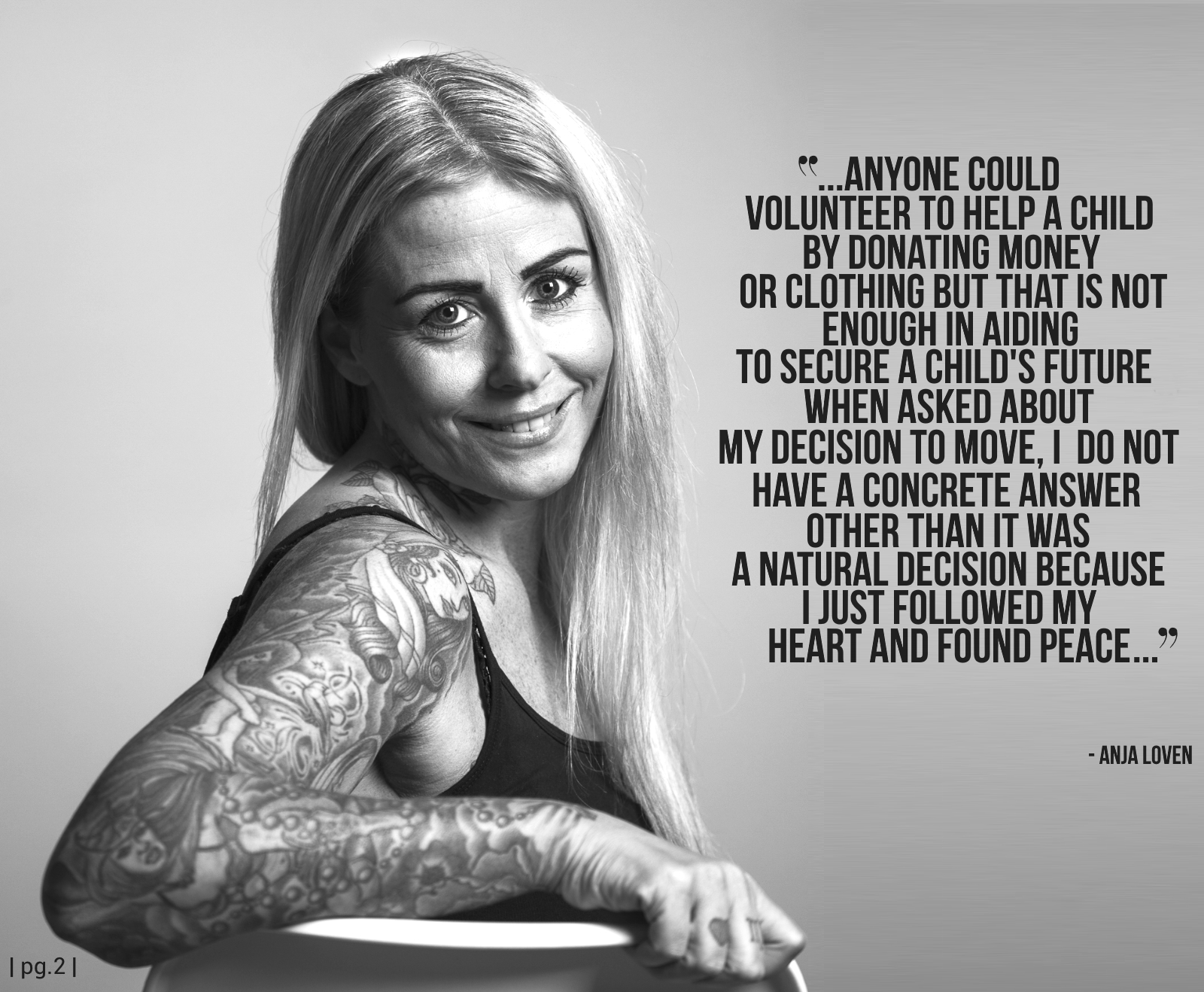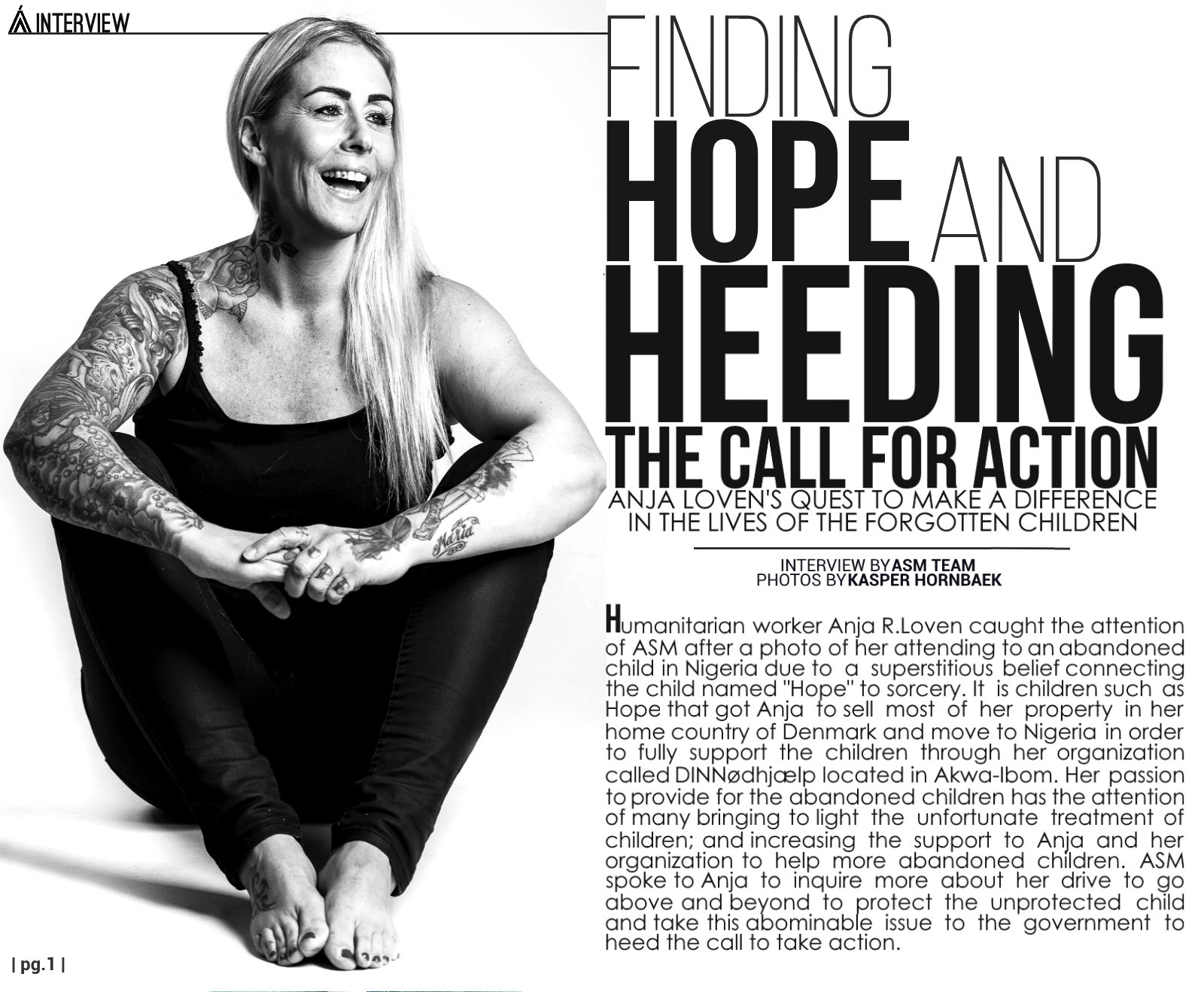ASM: Could you briefly describe for us the mission of your orphanage and what is the normal day in the life operation?
ANJA: We believe that all children deserve a good life, love and dignity. The mission is to make sure that the children we take care of here have access to education and a good life which in turn will put an end to the superstition that prevails in this area of Nigeria. We have a responsibility to the community to do advocacy work. The future of Africa is the children and so ensuring that they are taken care of is extremely important. A normal day at the orphanage is full of activities. Most of the children we rescue are those who have been abandoned and so the moment we bring in a child, we get to work immediately by getting them into school. This aids in the healing process. Getting up at 6am in the morning, the staff gets the children ready for school and at 7:30am they are taken to school. Upon their return, the children relax, play and then we teach them as well and help them with their homework. At the orphanage, there is never a dull moment. We are a family. With a lot of the trauma these children have gone through being abandoned and abused, we take our time to get them to open up by talking to them, playing sports with them; and just letting them know we care about them. So the entire staff is very active in the daily lives of each child.
ASM: You mentioned you have your own education program. What is your aim in educating the children beyond the school?
ANJA: Anyone could volunteer to help a child by donating money or clothing but that is not enough in aiding to secure a child’s future. We have to work on the future because education is key – especially for children who are from a poor environment. In doing so, we have children who are now heading off to college. It is amazing that these children who are so focused are growing up with vital education despite their unfortunate pasts. There are some who not go straight to university but they are able to pick up strong skills that are to their benefit. We have a kid who was lagging behind in his studies, but we found out after taking some tests that he is very talented with computers and we see his passion. He is currently learning more about computers and developing his skills. Another example are of two girls here who love sewing so they are building their skills in that field as they work with the sewing machines we have. These children just want a chance in having fulfilling lives; but due to poverty, and the ignorance in the superstitious belief that their families have about them, they are left out in the cold. Our job at the orphanage my husband and I started, gives the children a chance to fulfill their dreams. The team at the orphanage is extremely amazing with the children.

ASM: What brought you to the Continent and Nigeria to work there
ANJA: Malawi was actually the first African country I traveled to before I moved to Nigeria three years ago. I chose Nigeria because I came across a documentary in 2008 called the The Witch Children of Africa. I was startled by that because I had never heard of that before. I was raised by my mother who worked in an elderly home and she always educated my about children in other parts of the world who are suffering but she never mentioned anything about superstitious beliefs. So I was shocked that children would be accused and abandoned because of such beliefs. When I started my NGO in 2012, I did not have to think twice. I immediately saw myself going to Nigeria to see what was going on there and how I could be of help. I never got the documentary out of my head and was determined to go even though there were people who tried to deter me from doing so.
ASM: Were these superstitious beliefs relatively new or had it been something that had been around for a while. How did they come to be?
ANJA: Superstitions are quite prevalent in Rivers state, Cross River state and where I live, Akwa Ibom state. In Akwa Ibom, the Pentecostal Christian belief fused with the local tribal religion has a growing problem believing in such superstition. Those who say they are pastors or witch doctors take advantage of the uninformed by asking for money to take care of the ‘so-called’ witch children that could go as far as killing or abandoning the children. This all happens due to lack of education and prevalent poverty. I got so angry when I came down seeing bad it is. But I realized that I just had to take it upon myself to help change things around. During the 1500s in Denmark, women were burned alive for the same ignorant beliefs but things changed as people became educated. That is the same thing that needs to happen here. My husband grew up believing in this superstitious idea but as he grew older and educated himself, he realized how wrong it was. Together, we are working on changing things by pushing for education and helping these beautiful children who just need someone to love and take care of them. The idea that a child falls ill due to malaria or an illness; and he or she is immediately said to have some witchery connection without medical attention because of the consistent cries is baffling and has to be stopped. You do not see this happening in other parts of the country and so it is something that can and should be addressed.
ASM: It sounds like this issue is prevalent in the rural parts of the states you mentioned. So it is definitely an issue one has to go in person to address the issue.
ANJA: Yes it is. This is something that a good number of people may want to do but it is not an easy task. One has to be mentally, emotionally and financially prepared and sure to go on this journey. I saved up by selling my belongings and living on my sister’s couch as prepared myself for what was ahead. People asked me if I was sure I wanted to proceed and I did not hesitate in my answer because I knew I would be in Nigeria doing this. My mother was an inspiration because she loved taking care of people. She went out of her way to make sure those she took care of were comfortable and happy no matter the circumstances. She did this for many years and I knew I would follow her footsteps. So I did not have second thoughts when I made up my mind to help these beautiful children. It was drastic and people were surprised that I went through with it. When asked about my decision to move, I do not have a concrete answer other than it was a natural decision because I just followed my heart and I found peace in doing so. I have found my place in life. People find my story interesting but I do not see it that way. It is just my journey.
ASM: We are glad that you have your place. What is your vision for the orphanage? What do you want people to know?
ANJA: Last year, we just bought a land in Akwa Ibom that is the size of five football fields due to the kind donations from people in Denmark. My husband and I had a dream to build our own orphanage since the current place we are renting is expiring. Luckily, we got a call from Engineers without Borders who have volunteered their time to help in building the new orphanage. Also, since the rescue of little Hope, we got a lot more donations. With the extra donations, we are also building a health clinic for the orphanage and the community. We want to build a computer center, hire more staff members and bring in more children. Also, we definitely want increase our advocacy and outreach to help educate the community on the myths behind the superstitious beliefs with the hope of educating and changing the minds of the people in order to protect the children. People can go one our website to know more about us. Giving assistance would be greatly appreciated; but more importantly, educating oneself is highly encouraged.




